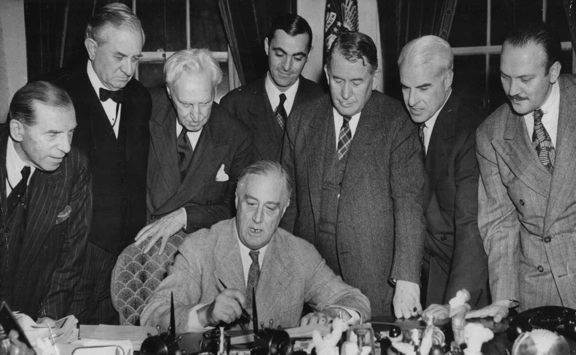Arsenal of Democracy

-
FDR Signing
In December 1940, with Great Britain running out of money to pay for arms purchases. President Roosevelt suggested the idea of lending arms to England. The United States became the Arsenal of Democracy.
The Neutrality Law was amended to allow the purchase of weapons by Great Britain (and other countries at war). Still, the Neutrality Law had one onerous provision– “Cash and Carry” (the prerequisite to pay cash and arrange transport for any purchase.) That was an acceptable practice when the war began. However, Britain’s needs were so great that it was quickly running out of money. President Roosevelt and the U.S. government were aware of the problem. They held marathon meetings to try to figure out how to proceed. Cutting off supplies to Britain was never an option. In early December, Roosevelt headed out on a cruise in the Caribbean to relax and refresh. His relaxation seemed to come to an end on December 9th, when a seaplane landed next to the U.S.S. Tuscaloosa, the Navy Cruiser he was on, brought him a correspondence from Prime Minister Churchill. Churchill described this lengthy letter as the most important correspondence of his life. In the letter Churchill expounded on the military situation at that time and the challenges that Great Britain faced. He then spoke of England’s greatest challenge– a lack of sufficient money.
“The moment approaches when we shall no longer be able to pay cash for shipping and other supplies. While we will do our utmost, and shrink from no proper sacrifice to make payments across the Exchange, I believe you will agree that it would be wrong in principle and mutually disadvantageous in effect if at the height of this struggle Great Britain were to be divested of all saleable assets, so that after the victory was won with our blood, civilization saved, and the time gained for the United States to be fully armed against all eventualities, we should stand stripped to the bone.”
F.D.R. spent two days contemplating how to proceed. Then the President came up with an idea– he would lend the goods to British. He would give them armaments, and they would return the arms when they were through using them. Roosevelt unveiled his plan at a December 17th Press Conference. F.D.R. stated, as only he could:
“Suppose my neighbor’s home catches fire, and I have a length of garden hose four or five hundred feet away. If he can take my garden hose and connect it up with his hydrant, I may help him to put out his fire. Now what do I do? I don’t say to him, “Neighbor, my garden hose cost me fifteen dollars; you have to pay me fifteen dollars for it.” No! I don’t want fifteen dollars. I want my garden hose back after the fire is over.”
“What I am trying to do is eliminate the dollar sign,” he continued. “Get rid of the silly, foolish, old dollar sign.”
December 29th was the date that was to become one of his most famous Fireside Addresses. Even at that time of the speech, people knew it was to be a historic address. The nation emptied public spaces by 9 PM to hear the speech live. 75% of Americans either heard the speech or read it. In the speech, President Roosevelt stated there was no hope for peace with Hitler.
“No man can tame a tiger into a kitten by stroking it. There can be no appeasement with ruthlessness. There can be no reasoning with an incendiary bomb.”
He went on to say:
“The people of Europe who are defending themselves do not ask us to do their fighting. They ask us for the implements of war, the planes, the tanks, the guns, which will enable them to fight for their liberty and for our security. Emphatically we must get these weapons to them in sufficient volume and quickly enough, so that we and our children will be saved the agony and suffering of war.
We must be the great arsenal of democracy. For this is an emergency as serious as war itself. We must apply ourselves to our task with the same resolution, the same sense of urgency, the same spirit of patriotism and sacrifice as we would show were we at war.”
And so it was to be. America was now officially the arsenal of the Western World.
 >
>